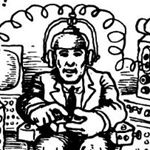A few weeks ago, in a Kyoto tempura bar, I watched a lone chef, a man in late middle age, cooking behind a counter for his 11 customers. The set menu had 15 items on it. That meant that at any given moment, he was keeping track of 165 pieces of food, each subject to slightly different timing and technique. He wrote nothing down and expended no apparent effort. It was a demonstration of total mastery. This didn’t look so much like a job as a life: His work was his whole being.
That’s a thing you notice in Japan, the deep personal investment people make in their work. The word shokunin, which has no direct translation, sums it up: It means something like “master or mastery of one’s profession,” and it captures the way Japanese workers spend every day trying to be better at what they do.
Shokunin culture can have a side that, to those of us raised on a more brutally capitalistic worldview, verges on the ridiculous. Outside the Sanjusangendo temple in Kyoto, I saw a man standing with a yellow glow stick, pointing pedestrians toward the sidewalk instead of to the parking lot nearby. Presumably, if a vehicle had come, he would have pointed it toward the lot. “That guy is basically a sign,” my son said. He was right — and this was a job you often see in Japan, often in relation to vehicular access: a person performing a job that in any other developed society is either automated away or ignored.
On another occasion, while waiting at a bus stop in the seaside city of Kobe, I found myself watching a group of five men who were drilling a hole. Or rather, one of them was; the other four were watching him. For the whole 30 minutes, that’s all they did. But they didn’t do it reluctantly, or while checking their smartphones, or gossiping, or anything. It was like a demonstration: “All other techniques for watching a guy dig a hole are incorrect. This is how you watch a guy digging a hole.”
Continued
| Hot Topics | |
|---|---|
the distinctive Japanese attitude toward meaning in work
25 posts
• Page 1 of 1
the distinctive Japanese attitude toward meaning in work
What the West Can Learn From Japan About the Cultural Value of Work
•I prefer liberty with danger to peace with slavery.•
-

Mike Oxlong - Posts: 6818
- Joined: Wed Oct 20, 2004 5:47 pm
- Location: 古き良き日本
Re: the distinctive Japanese attitude toward meaning in work
Fuck, where to start? I'm clicking through to the article in hopes of more!
-

wagyl - Maezumo
- Posts: 5950
- Images: 0
- Joined: Thu Mar 17, 2011 11:08 pm
- Location: The Great Plain of the Fourth Instance
Re: the distinctive Japanese attitude toward meaning in work
Lost me in the second paragraph.
Shokunin = Craftsman, Tradesman, Artisan ...
"No direct translation" ... pshaw. People just love saying that about the Japanese language without giving it any real thought, probably because they really want to believe, or want you to believe, that they've discovered some sort of esoteric oriental secret. Like "omotenashi": "well it's sort of like 'hospitality,' but with a unique Japanese spiritual Zen-like ..." AAARGH!! It's fucking hospitality fer fuck's sake!!
Thank you.
Shokunin = Craftsman, Tradesman, Artisan ...
"No direct translation" ... pshaw. People just love saying that about the Japanese language without giving it any real thought, probably because they really want to believe, or want you to believe, that they've discovered some sort of esoteric oriental secret. Like "omotenashi": "well it's sort of like 'hospitality,' but with a unique Japanese spiritual Zen-like ..." AAARGH!! It's fucking hospitality fer fuck's sake!!
Thank you.
-

Yokohammer - Posts: 5090
- Joined: Tue Sep 30, 2008 6:41 pm
- Location: South of Sendai
Re: the distinctive Japanese attitude toward meaning in work
Maybe it is just that the author has a different definition of shokunin to everyone else in the world, including you, me and the Japanese. That is the only way you can explain his praising the spirit of craftsmanship of the man doing the Pointer Sisters mime, or of the four guys standing around while the one guy digs a hole.
After all, this author also believes that number of seats in a restaurant multiplied by number of items on the menu divided by number of people working in the kitchen is a meaningful statistic.
After all, this author also believes that number of seats in a restaurant multiplied by number of items on the menu divided by number of people working in the kitchen is a meaningful statistic.
-

wagyl - Maezumo
- Posts: 5950
- Images: 0
- Joined: Thu Mar 17, 2011 11:08 pm
- Location: The Great Plain of the Fourth Instance
Re: the distinctive Japanese attitude toward meaning in work
ordinary japanese people do not have any single piece of responsibility for the delusional japan made up by know-it-all weeaboos.
-

Takechanpoo - Posts: 4294
- Images: 4
- Joined: Fri Oct 06, 2006 10:47 pm
- Location: Tama Prefecture(多摩県)
Re: the distinctive Japanese attitude toward meaning in work
wagyl wrote:Maybe it is just that the author has a different definition of shokunin to everyone else in the world, including you, me and the Japanese. That is the only way you can explain his praising the spirit of craftsmanship of the man doing the Pointer Sisters mime, or of the four guys standing around while the one guy digs a hole.
After all, this author also believes that number of seats in a restaurant multiplied by number of items on the menu divided by number of people working in the kitchen is a meaningful statistic.
Yeah, I had a little giggle at that too. 15 menu items and 11 seats means 256 what exactly. Given that it is a tempura restaurant, eleven covers able to order from a menu of 15 items in the same genre doesn't seem all that onerous. A friend has a restaurant in Brighton with more like 40 covers and a diverse menu with at least that many options. OK, so the cook has a helper but it isn't that amazing that they manage to cope.
It is a tale told by an idiot, full of sound and fury, signifying nothing.
- Macbeth (Act 5, Scene 5)
William Shakespeare, April 1564 - May 3rd 1616
- Macbeth (Act 5, Scene 5)
William Shakespeare, April 1564 - May 3rd 1616
-

Wage Slave - Maezumo
- Posts: 3765
- Joined: Wed Aug 15, 2012 12:40 am
Re: the distinctive Japanese attitude toward meaning in work
Does this shokunindamashi thing hold true for the youngsters I wonder?
-

legion - Maezumo
- Posts: 2681
- Joined: Thu Dec 09, 2010 11:30 pm
- Location: Tokyo
Re: the distinctive Japanese attitude toward meaning in work
If written "職人騙し", possibly.
-

yanpa - Posts: 5671
- Images: 11
- Joined: Sun Nov 04, 2007 11:50 am
- Location: Tokyo
Re: the distinctive Japanese attitude toward meaning in work
Takechanpoo wrote:ordinary japanese people do not have any single piece of responsibility for the delusional japan made up by know-it-all weeaboos.
Yes they are too busy cultivating their own flavor of delusionnal yamato supremacy...
(Also good news, Vietnamese came to their senses and shitcanned the nukaplant project shovelled in by japan inc)
-

Coligny - Posts: 21824
- Images: 10
- Joined: Sat Jan 17, 2009 8:12 pm
- Location: Mostly big mouth and bad ideas...
Re: the distinctive Japanese attitude toward meaning in work
Yokohammer wrote:Lost me in the second paragraph.
Shokunin = Craftsman, Tradesman, Artisan ...
"No direct translation" ... pshaw. People just love saying that about the Japanese language without giving it any real thought, probably because they really want to believe, or want you to believe, that they've discovered some sort of esoteric oriental secret. Like "omotenashi": "well it's sort of like 'hospitality,' but with a unique Japanese spiritual Zen-like ..." AAARGH!! It's fucking hospitality fer fuck's sake!!
Thank you.
Well... unless they have gotten an official dictionnary... they do have a point...
If Tanaka Joe want to call an apple "空母" ... nothing can really stop him...
-

Coligny - Posts: 21824
- Images: 10
- Joined: Sat Jan 17, 2009 8:12 pm
- Location: Mostly big mouth and bad ideas...
Re: the distinctive Japanese attitude toward meaning in work
I have been told that Japanese is a much more expressive and nuanced language than English.
It is probably worth noting that people who cling tenaciously to such opinions are invariably proficient in only one of the languages mentioned.
It is probably worth noting that people who cling tenaciously to such opinions are invariably proficient in only one of the languages mentioned.
-

Yokohammer - Posts: 5090
- Joined: Tue Sep 30, 2008 6:41 pm
- Location: South of Sendai
Re: the distinctive Japanese attitude toward meaning in work
Yokohammer wrote:I have been told that Japanese is a much more expressive and nuanced language than English.
It is probably worth noting that people who cling tenaciously to such opinions are invariably proficient in only one of the languages mentioned.
I've heard/seen many times over the hears the superiority of English praised (again by monolingual native speakers), among others because it has pig/pork, cow/beef etcera and hence a richness of vocabulary and nuances not present in other languages. I've also heard that it's impossible to have a debate in German as the verb comes at the end of the sentence, and it's impossible to implement a filing system in Japanese as the writing system has no defined way of ordering names.
-

yanpa - Posts: 5671
- Images: 11
- Joined: Sun Nov 04, 2007 11:50 am
- Location: Tokyo
Re: the distinctive Japanese attitude toward meaning in work
Mike Oxlong wrote:I saw a man standing with a yellow glow stick, pointing pedestrians toward the sidewalk instead of to the parking lot nearby. Presumably, if a vehicle had come, he would have pointed it toward the lot. “That guy is basically a sign,” my son said. He was right — and this was a job you often see in Japan, often in relation to vehicular access: a person performing a job that in any other developed society is either automated away or ignored.

Cause Seniors standing in the streets, waving glow sticks is totally related to shokunin culture....I wonder if he imagines the guy has a wall of expensive hand-made glow sticks at home...
yanpa wrote:Yokohammer wrote:I have been told that Japanese is a much more expressive and nuanced language than English.
It is probably worth noting that people who cling tenaciously to such opinions are invariably proficient in only one of the languages mentioned.
I've heard/seen many times over the hears the superiority of English praised (again by monolingual native speakers), among others because it has pig/pork, cow/beef etcera and hence a richness of vocabulary and nuances not present in other languages. I've also heard that it's impossible to have a debate in German as the verb comes at the end of the sentence, and it's impossible to implement a filing system in Japanese as the writing system has no defined way of ordering names.
I'm more used to hearing Japanese with only a very basic grasp of pidgin English telling me how easy English is and how difficult Japanese is.
-

matsuki - Posts: 16047
- Joined: Wed Feb 02, 2011 4:29 pm
- Location: All Aisu deserves a good bukkake
Re: the distinctive Japanese attitude toward meaning in work
No, he has one and it was given to him by Tokugawa himself. Honour!matsuki wrote:the guy has a wall of expensive hand-made glow sticks at home...
-

Grumpy Gramps - Maezumo
- Posts: 2204
- Joined: Mon Oct 14, 2013 2:22 am
- Location: 地獄の便所
Re: the distinctive Japanese attitude toward meaning in work
The writer is said to have grown up in Hong Kong, which perhaps explains his deep insights into Japanese culture. 
•I prefer liberty with danger to peace with slavery.•
-

Mike Oxlong - Posts: 6818
- Joined: Wed Oct 20, 2004 5:47 pm
- Location: 古き良き日本
Re: the distinctive Japanese attitude toward meaning in work
well, there might be a tendency that japanese syokunins do their work thoroughly while even sacrificing the profit. maybe.
its as if they have faith in their work itself or just an extreme myopia.
its as if they have faith in their work itself or just an extreme myopia.
-

Takechanpoo - Posts: 4294
- Images: 4
- Joined: Fri Oct 06, 2006 10:47 pm
- Location: Tama Prefecture(多摩県)
Re: the distinctive Japanese attitude toward meaning in work
Takechanpoo wrote:well, there might be a tendency that japanese syokunins do their work thoroughly while even sacrificing the profit. maybe.
its as if they have faith in their work itself or just an extreme myopia.
doesn't that attitude date back to a period in history where Japan hit a period of over production so the idea of the process being as important as the product was promoted?
-

legion - Maezumo
- Posts: 2681
- Joined: Thu Dec 09, 2010 11:30 pm
- Location: Tokyo
Re: the distinctive Japanese attitude toward meaning in work
If one looks into the way people lived in the Edo period, one discovers that the Japanese had a much better work-life balance back then (i.e. they really didn't work very hard). Carpenters, for example, would often knock off at somewhere between noon and two o'clock, and spend the rest of the day just hangin' and enjoying themselves. Not much overtime in Edo.
It's always fun to bring such facts up when someone attempts to conflate concepts like race and diligence, for example. Actually, you just have to look around today to prove that theory wrong. Some do, some don't. You normally only notice the ones who do.
It's always fun to bring such facts up when someone attempts to conflate concepts like race and diligence, for example. Actually, you just have to look around today to prove that theory wrong. Some do, some don't. You normally only notice the ones who do.
-

Yokohammer - Posts: 5090
- Joined: Tue Sep 30, 2008 6:41 pm
- Location: South of Sendai
Re: the distinctive Japanese attitude toward meaning in work
Nice points. Very few of the rural people engaged in Traditional Occupations I knew worked very hard or long at all. Hard Work is for the Town Hall salaried office types, and the hardest thing about that is biding your down time until you can leave. But rice farming and thatch cutting are strenuous, no doubt ferschur
-

kurogane - Maezumo
- Posts: 4483
- Joined: Fri Aug 04, 2006 5:24 pm
- Location: Here
Re: the distinctive Japanese attitude toward meaning in work
kurogane wrote:But rice farming and thatch cutting are strenuous, no doubt ferschur
Even so, both of those are intensely seasonal work. There are many months of idleness in both activities.
-

wagyl - Maezumo
- Posts: 5950
- Images: 0
- Joined: Thu Mar 17, 2011 11:08 pm
- Location: The Great Plain of the Fourth Instance
Re: the distinctive Japanese attitude toward meaning in work
Good points, but I was referring more to the daily routine like Yokohammer was. Even the busy days are pretty slow measured in hours against salaried office work. Which makes sense, of course, being actual physical labour and all. I think it is EP Thompson that is the classic, but there is a fair bit of study done on the industrialisation of time, and as YokoH pointed out people used to farg around a lot more before the advent of the punch clock, which is a way better way to do it in MYHOMO
-

kurogane - Maezumo
- Posts: 4483
- Joined: Fri Aug 04, 2006 5:24 pm
- Location: Here
Re: the distinctive Japanese attitude toward meaning in work
Can we blame Ford for this shit ?
-

Coligny - Posts: 21824
- Images: 10
- Joined: Sat Jan 17, 2009 8:12 pm
- Location: Mostly big mouth and bad ideas...
Re: the distinctive Japanese attitude toward meaning in work
Can't be coincidence that the Guardian features a Long Read today that is perfectly fit for this thread.
Why time management is ruining our lives
It gets better and better as the writing evolves. I promise.
Why time management is ruining our lives
The eternal human struggle to live meaningfully in the face of inevitable death entered its newest phase one Monday in the summer of 2007, when employees of Google gathered to hear a talk by a writer and self-avowed geek named Merlin Mann. Their biggest professional problem was email, the digital blight that was colonising more and more of their hours, squeezing out time for more important work, or for having a life. And Mann, a rising star of the “personal productivity” movement, seemed like he might have found the answer.
He called his system “Inbox Zero”, and the basic idea was simple enough. Most of us get into bad habits with email: we check our messages every few minutes, read them and feel vaguely stressed about them, but take little or no action, so they pile up into an even more stress-inducing heap. Instead, Mann advised his audience that day at Google’s Silicon Valley campus, every time you visit your inbox, you should systematically “process to zero”. Clarify the action each message requires – a reply, an entry on your to-do list, or just filing it away. Perform that action. Repeat until no emails remain. Then close your inbox, and get on with living.
“It was really just a way of saying, ‘I suck at email, and here’s stuff that makes me suck less at it – you may find it useful,’” Mann recalled later. But he had stumbled on a rich seam of societal anxiety. Hundreds of thousands of people watched his talk online, and Inbox Zero spawned countless blog posts, along with books and apps. It was the Atkins diet for nerds: if you weren’t doing it yourself, you almost certainly knew someone who was. Mann’s followers triumphantly posted screenshots of their empty inboxes; the New Yorker, discerning his increasingly cult-like following, described his system as “halfway between Scientology and Zen”. (The New York Post called it bullshit.)
If all this fervour seems extreme – Inbox Zero was just a set of technical instructions for handling email, after all – this was because email had become far more than a technical problem. It functioned as a kind of infinite to-do list, to which anyone on the planet could add anything at will. For the “knowledge workers” of the digital economy, it was both metaphor and delivery mechanism for the feeling that the pressure of trying to complete an ever-increasing number of tasks, in a finite quantity of time, was becoming impossible to bear.
Most of us have experienced this creeping sense of being overwhelmed: the feeling not merely that our lives are full of activity – that can be exhilarating – but that time is slipping out of our control. And today, the personal productivity movement that Mann helped launch – which promises to ease the pain with time-management advice tailored to the era of smartphones and the internet – is flourishing as never before. There are now thousands of apps in the “productivity” category of the Apple app store, including software to simulate the ambient noise of working in a coffee shop (this has been shown, in psychology experiments, to help people focus on work), and a text editor that deletes the words you have written if you don’t keep typing fast enough.
The quest for increased personal productivity – for making the best possible use of your limited time – is a dominant motif of our age. Two books on the topic by the New York Times journalist Charles Duhigg have spent more than 60 weeks on the US bestseller lists between them, and the improbable titular promise of another book, The Four Hour Work Week, has seduced a reported 1.35m readers worldwide. There are blogs offering tips on productive dating, and on the potential result of productive dating, productive parenting; signs have been spotted in American hotels wishing visitors a “productive stay”. The archetypal Silicon Valley startup, in the last few years, has been one that promises to free up time and mental capacity by eliminating some irritating “friction” of daily life – shopping or laundry, or even eating, in the case of the sludgy, beige meal replacement Soylent – almost always for the purpose of doing more work.
And yet the truth is that more often than not, techniques designed to enhance one’s personal productivity seem to exacerbate the very anxieties they were meant to allay. The better you get at managing time, the less of it you feel that you have. Even when people did successfully implement Inbox Zero, it didn’t reliably bring calm. Some interpreted it to mean that every email deserved a reply, which only shackled them more firmly to their inboxes. (“That drives me crazy,” Mann says.) Others grew jumpy at the thought of any messages cluttering an inbox that was supposed to stay pristine, and so ended up checking more frequently. My own dismaying experience with Inbox Zero was that becoming hyper-efficient at processing email meant I ended up getting more email: after all, it’s often the case that replying to a message generates a reply to that reply, and so on. (By contrast, negligent emailers often discover that forgetting to reply brings certain advantages: people find alternative solutions to the problems they were nagging you to solve, or the looming crisis they were emailing about never occurs.)
More
It gets better and better as the writing evolves. I promise.
“To learn who rules over you, simply find out who you are not allowed to criticize.”
“I know not with what weapons World War III will be fought, but World War IV will be fought with sticks and stones.” ― Albert Einstein
-

Russell - Maezumo
- Posts: 8580
- Images: 1
- Joined: Fri Aug 13, 2010 11:51 pm
Re: the distinctive Japanese attitude toward meaning in work
Nice one Russell. Lots to think about there.
Sent from my iPad using Tapatalk
Sent from my iPad using Tapatalk
_/_/_/ Phmeh ... _/_/_/
-

Yokohammer - Posts: 5090
- Joined: Tue Sep 30, 2008 6:41 pm
- Location: South of Sendai
Re: the distinctive Japanese attitude toward meaning in work
The only thing i used from "getting things done" is to write down what exactly the next task was to be instead of writing "continue project xyz"
Which can transform "remodel the bathroom" into "clean cat shitter and teach them to go to the relocated spot"
Not really good for motivation...
Which can transform "remodel the bathroom" into "clean cat shitter and teach them to go to the relocated spot"
Not really good for motivation...
-

Coligny - Posts: 21824
- Images: 10
- Joined: Sat Jan 17, 2009 8:12 pm
- Location: Mostly big mouth and bad ideas...
25 posts
• Page 1 of 1
Return to Another newbie reporter "discovers" Japan
Who is online
Users browsing this forum: No registered users and 3 guests

